Get A Quote
Omnibus Technical Regulation (OTR) Amendment Order, 2025
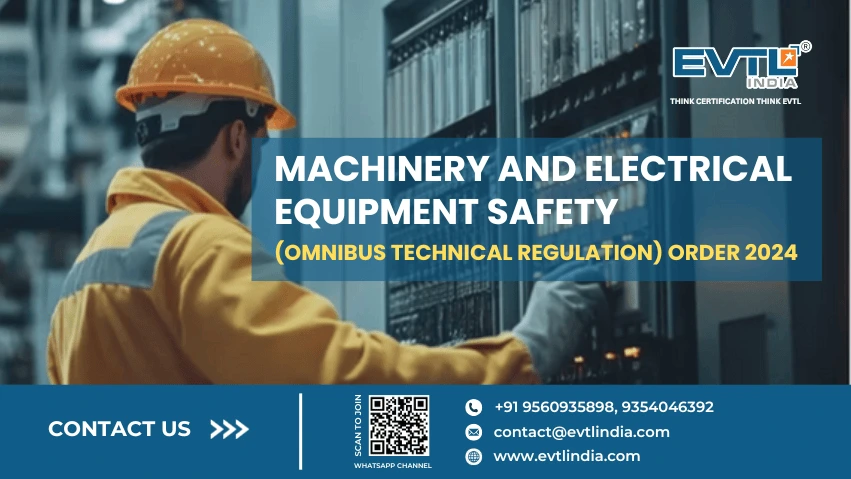
In August 2024, the Ministry of Heavy Industry introduced a comprehensive regulation known as the Machinery and Electrical Equipment Safety (Omnibus Technical Regulation) Order, 2024. This regulation is a significant step forward in aligning Indian safety standards with international practices, ensuring machinery and electrical equipment manufactured or sold in India meet stringent safety requirements.
Further, on 12th June 2025, the Ministry issued the Machinery and Electrical Equipment Safety (Omnibus Technical Regulation) Amendment Order, 2025. According to this amendment, the regulations will come into effect for machinery and electrical equipment listed in the First Schedule of the Order starting from 1st September 2026. Below is a detailed breakdown of the regulation and what it entails.
Omnibus Technical Regulation (OTR) Amendment Order, 2025
The Machinery and Electrical Equipment Safety (Omnibus Technical
Regulation) Amendment Order, 2025 is a new set of safety standards introduced to
improve the quality and safety of machines and electrical equipment in India.
This regulation aims to protect consumers, workers, and the environment by
ensuring that these products comply with high safety standards. It is part of
the government's effort to enhance product reliability and reduce risks
associated with the operation of machinery and electrical devices.
Key Highlights
of the Order
- Title and Implementation TimelineThe Machinery and Electrical Equipment Safety (Omnibus Technical Regulation) Order, 2024 was initially set to take effect one year after its publication in the Official Gazette. However, the implementation timeline was later extended through the Amendment Order, 2025, pushing the compliance deadline to 1st September 2026. This extension provides manufacturers, importers, and businesses additional time to align with the updated regulatory standards.
- Scope of ApplicationThis order covers a wide range of machinery and electrical equipment, including their assemblies, sub-assemblies, and components. However, any machinery or electrical equipment already covered under other existing regulations under the Bureau of Indian Standards Act, 2016, will not fall under this Order's scope. This ensures there is no overlap with existing standards and that each regulation focuses on specific product categories.
Conformity to
Safety Standards
One of the core elements of the Order
is the requirement for machines and electrical equipment to meet strict safety
standards:
● Type C Standards: These standards are detailed and pertain to specific machinery types or categories. If a Type C standard contradicts a provision in a Type A or B standard, the Type C standard takes precedence, providing more tailored guidelines for particular machines.
Also Read
BIS Scheme X CertificationCertification
Requirements
● All machines and electrical equipment listed in the first Schedule of the Order must bear the BIS Standard Mark under a valid license. This confirms that the product meets the prescribed Indian Standards.
● For products not intended for
continuous manufacturing, manufacturers can obtain a Certificate of Conformity instead of a license, following the provisions
in the Scheme X of the Conformity
Assessment Regulations, 2018.
● Before applying for a BIS
license or certificate, manufacturers are required to register with the Bureau
of Indian Standards (BIS). This ensures that the manufacturing process aligns
with safety protocols from the outset.
Labeling,
Marking, and Technical Documentation
To comply with the regulation,
manufacturers must adhere to labeling, marking, and safety instruction
requirements. This includes:
●Technical Documentation: A comprehensive technical file must be maintained, detailing risk assessments, design features, and safety compliance measures. This file acts as a reference for the product’s safety credentials.
Monitoring and
Enforcement
The Bureau of Indian Standards (BIS) is the primary authority
responsible for certification, enforcement, and market surveillance:
● Enforcement: Any violations of the Order's provisions will be penalized under the relevant sections of the BIS Act, 2016. This underscores the government's commitment to strict enforcement and adherence to safety standards.
Exemptions and
Special Provisions
The Order provides certain exemptions
to ensure flexibility in implementation:
● Construction equipment covered under the CMVR Rule 1989, regulated by the Ministry of Road Transport and Highways (MoRTH), is also exempt from this Order to avoid overlapping regulations.
Any future updates to the Indian
Standards referenced in the Order will automatically apply once notified by
BIS. This ensures that the regulation remains dynamic and in line with
technological advancements and global safety practices.
Penalties for
Non-Compliance
Non-compliance with the Order carries
penalties as outlined in the BIS Act, 2016. These penalties aim to ensure that
manufacturers and businesses prioritize safety, thereby protecting consumers
from substandard products.
Conclusion
The Machinery and Electrical Equipment Safety (Omnibus Technical
Regulation) Amendment Order, 2025 is a landmark regulation in India’s effort to
enhance machinery and electrical safety. By setting clear and stringent
standards, the regulation is poised to improve product quality, ensure safer
work environments, and align Indian safety practices with global benchmarks.
Manufacturers and stakeholders in the machinery and electrical equipment
industry must prepare for this transition, ensuring they adhere to these standards
within the stipulated timeline.
This Order is a crucial step towards
fostering a culture of safety, quality, and innovation in the Indian industrial
landscape, benefiting both consumers and manufacturers.
You can contact us via email at contact@evtlindia.com or by phone at 9560935898. Feel free to get in touch with us anytime for the support you need.
BIS ISI Mark Certification | BIS-CRS Certification | EPR E-WASTE | WMI Registration | BIS Certification For Footwear | TAC & IMEI Registration | BIS FMCS Page | TEC | EPR Registration for Plastic Waste Management | EPR Registration for Battery Waste Management | EPR Registration For Used Oil | EPR Registration for Tyre Waste Management | WPC ETA License | NOC | LMPC | Legal Metrology | Trademark Registration | ISO Certification | EMI-EMC Test | Toys | GEM Registration | EPCG Scheme | LM 79 & LM 80 | ROHS Approval | CDSCO Registration | RF Testing | IP Rating Test | MSME & NSIC Registration | BIS Certificate for Conformity | BIS Scheme-X Certification | Hallmark Registration | Laboratory Recognition Scheme | ECO-MARK Certification | RDSO | CE Certification | List Of Equipments | US FDA Registration | Lab Setup & Lab Equipment |
Recent Posts
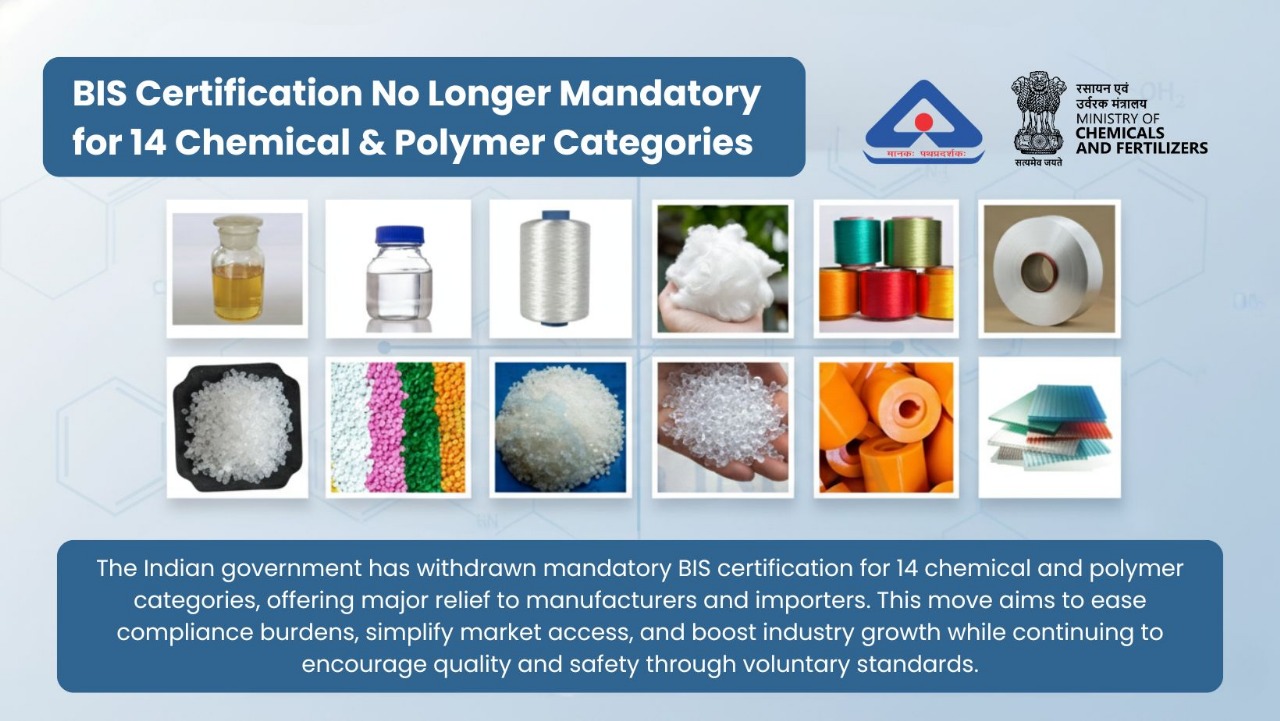
BIS Certification No Longer Mandatory for 14 Chemical & Polymer Categories
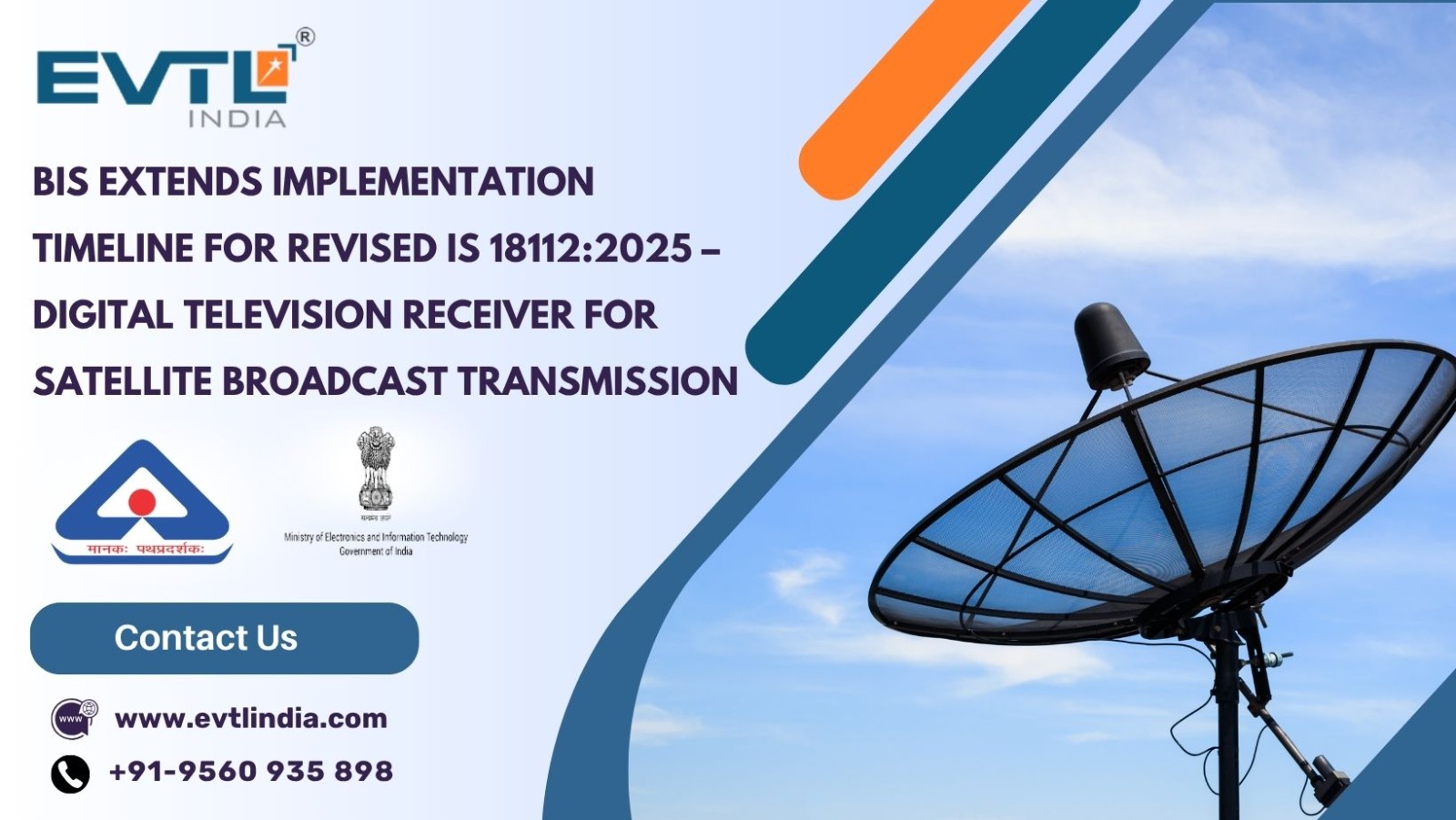
BIS Extends Implementation Deadline for Revised IS 18112:2025 – Digital Television Receivers for Satellite Broadcast Transmission
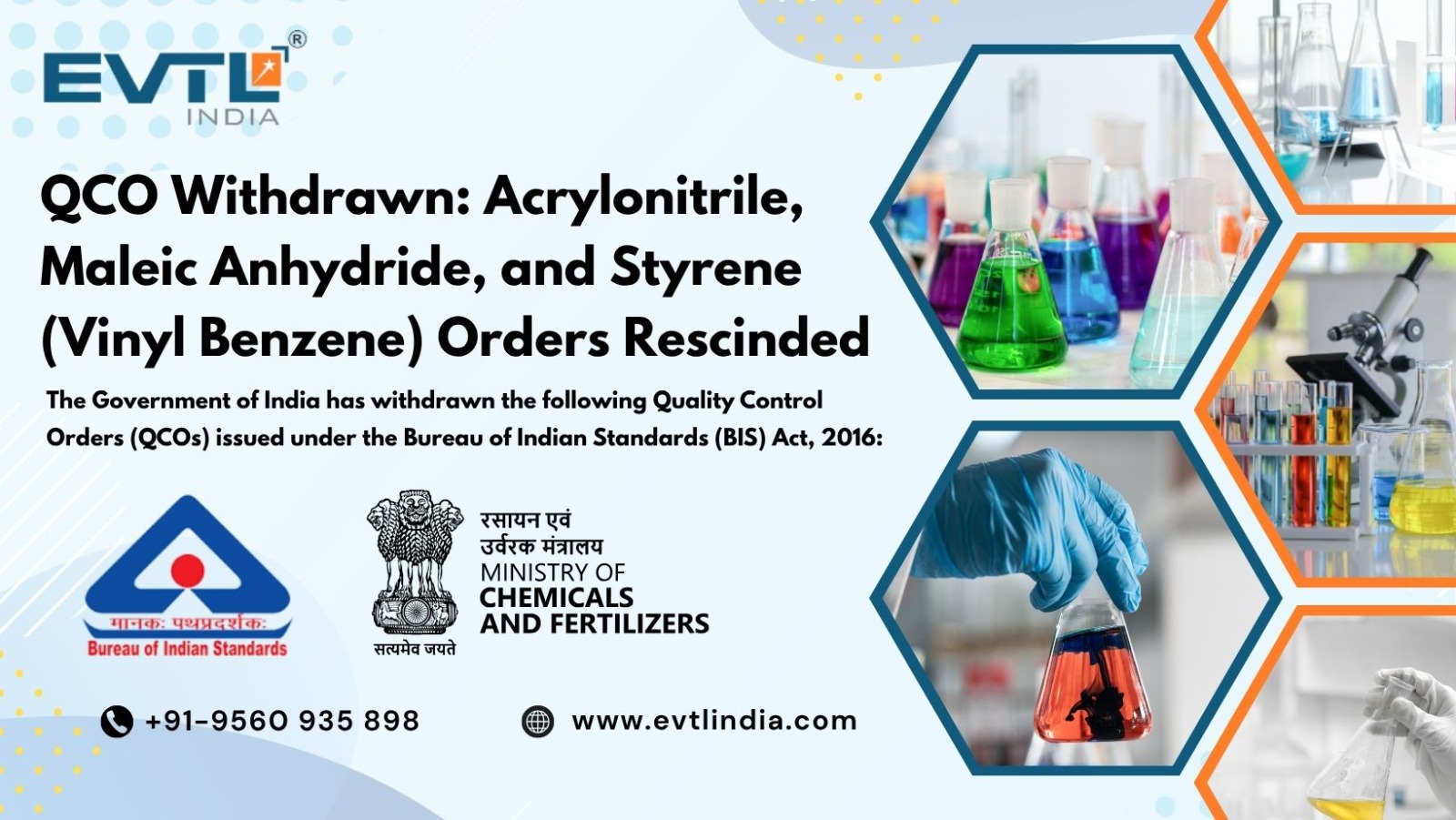
Government Withdraws Quality Control Orders for Six Chemicals – BIS Certification No Longer Mandatory
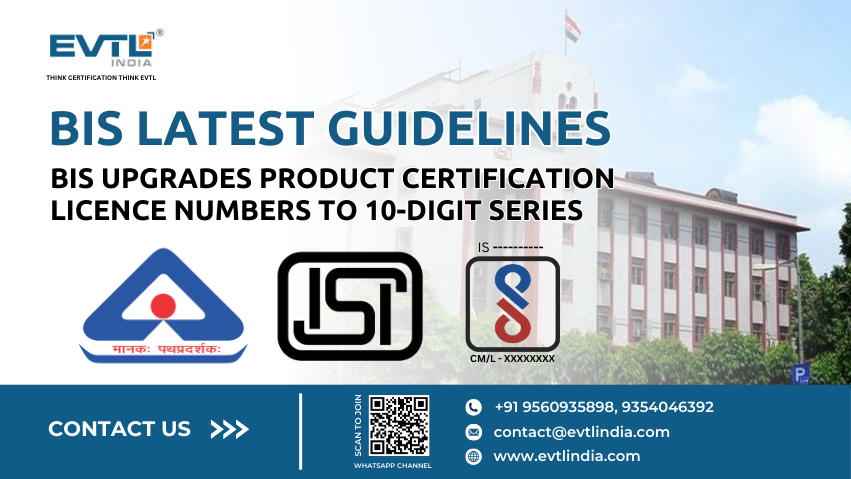
BIS Upgrades Product Certification License Numbers to 10-Digit Series
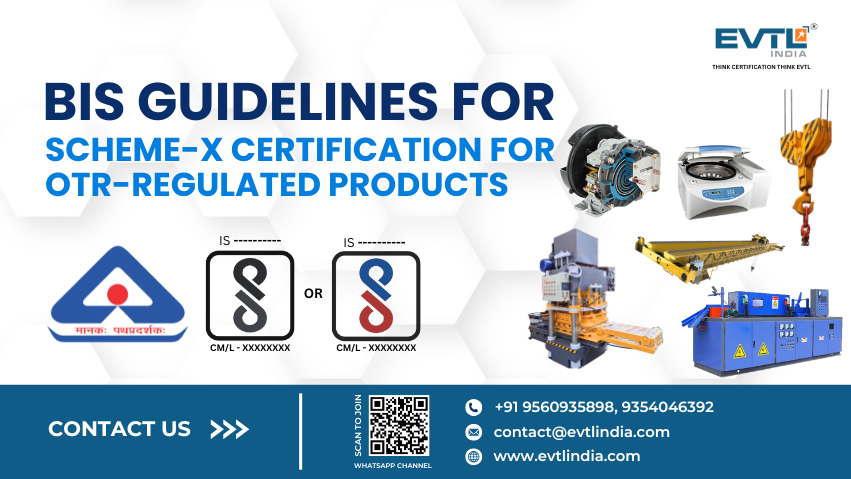
BIS Guidelines for Scheme-X Certification for OTR-Regulated Products
Free Call Back
Why Choose EVTL INDIA
Expertise in Indian Regulatory Standards
End-to-End Support
Trusted by Top Indian & Global Brands
Fast Processing & Transparent Pricing
Strong Liaison with Indian Authorities
Company Profile














